"be good"
"be good"

Mauve Desert
First published in 1987, Nicole Brossard's classic novel returns to Coach House in a new edition. A seminal text in Canadian and feminist literature, Mauve Desert is a must-read for readers and writers alike.
This is both a single novel and three separate novels in one. In the first, Mauve Desert, fifteen-year-old Mélanie drives across the Arizona desert in a white Meteor chasing fear and desire, cutting loose from her mother and her mother's lover, Lorna, in their roadside Mauve Motel. In the second book, Maudes Laures reads Mauve Desert, becomes obsessed with it, and embarks on an extraordinary quest for its mysterious author, characters and meaning. The third book - Mauve, the horizon - is Laures's eventual translation of Mauve Desert. Like all good translations, it is both the same and revealingly different from the original.
Nicole Brossard's writing is agile and inventive; from moment to moment gripping, exhilarating and erotic. Her language drifts and swells like sand dunes in a desert, cresting and accumulating into a landscape that shifts like wind and words; she translates the practice of translation, the pulse of desire.
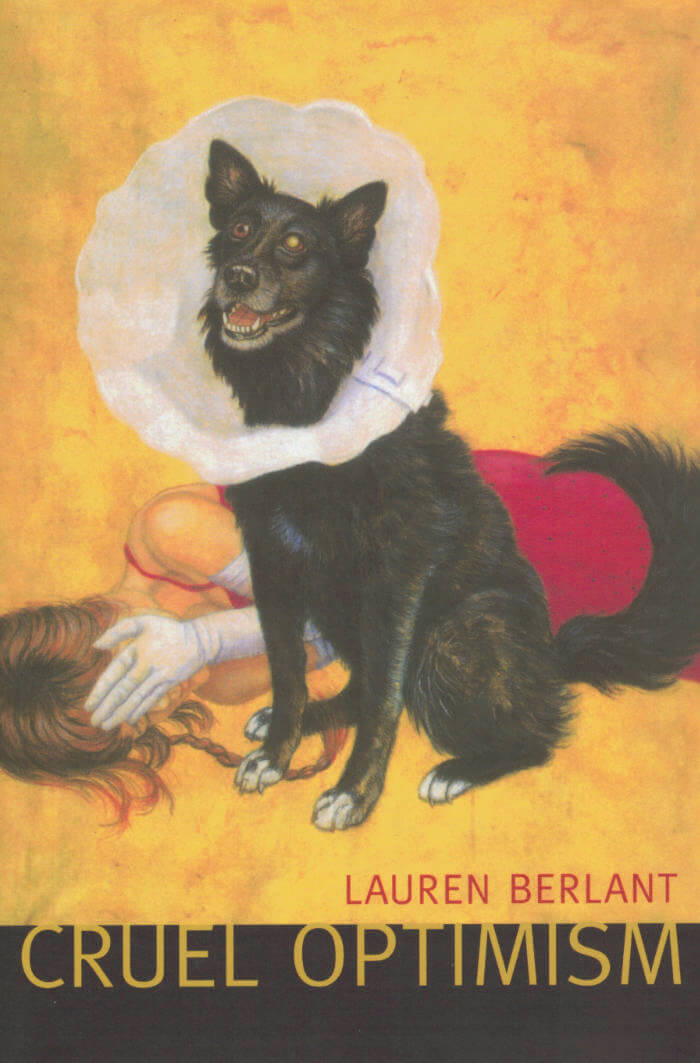
Cruel Optimism
A relation of cruel optimism exists when something you desire is actually an obstacle to your flourishing. Offering bold new ways of conceiving the present, Lauren Berlant describes the cruel optimism that has prevailed since the 1980s, as the social-democratic promise of the postwar period in the United States and Europe has retracted. People have remained attached to unachievable fantasies of the good life—with its promises of upward mobility, job security, political and social equality, and durable intimacy—despite evidence that liberal-capitalist societies can no longer be counted on to provide opportunities for individuals to make their lives “add up to something.”
Arguing that the historical present is perceived affectively before it is understood in any other way, Berlant traces affective and aesthetic responses to the dramas of adjustment that unfold amid talk of precarity, contingency, and crisis. She suggests that our stretched-out present is characterized by new modes of temporality, and she explains why trauma theory—with its focus on reactions to the exceptional event that shatters the ordinary—is not useful for understanding the ways that people adjust over time, once crisis itself has become ordinary. Cruel Optimism is a remarkable affective history of the present.
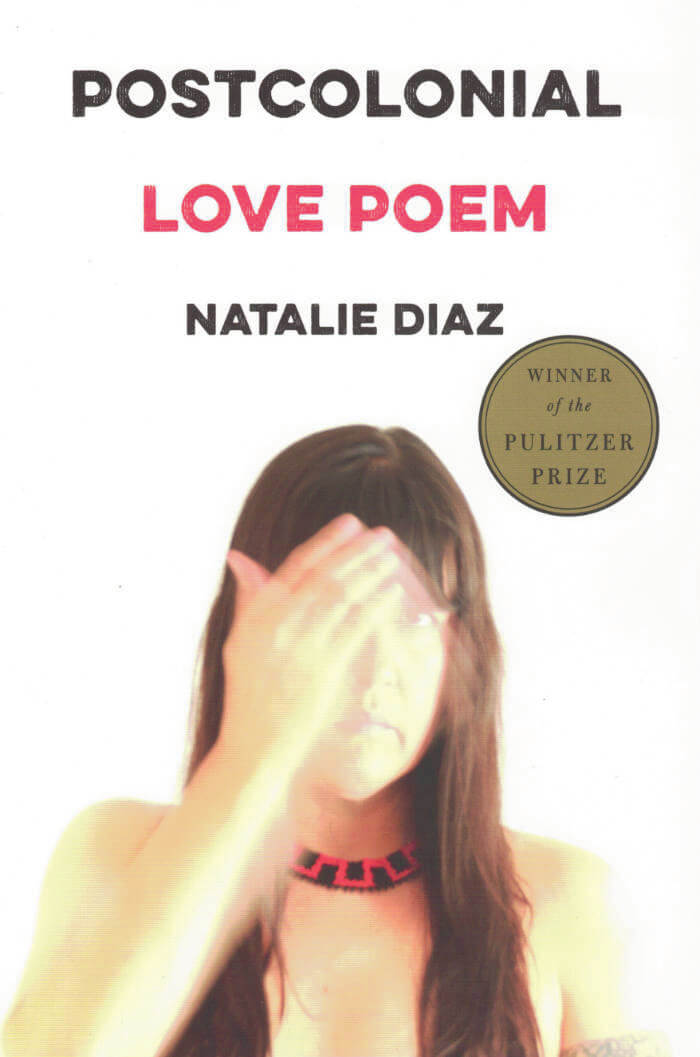
Postcolonial Love Poem
Postcolonial Love Poem is an anthem of desire against erasure. Natalie Diaz's brilliant second collection demands that every body carried in its pages—bodies of language, land, rivers, suffering brothers, enemies, and lovers—be touched and held as beloveds. Through these poems, the wounds inflicted by America onto an indigenous people are allowed to bloom pleasure and tenderness: "Let me call my anxiety, desire, then. / Let me call it, a garden." In this new lyrical landscape, the bodies of indigenous, Latinx, black, and brown women are simultaneously the body politic and the body ecstatic. In claiming this autonomy of desire, language is pushed to its dark edges, the astonishing dunefields and forests where pleasure and love are both grief and joy, violence and sensuality.
Diaz defies the conditions from which she writes, a nation whose creation predicated the diminishment and ultimate erasure of bodies like hers and the people she loves: "I am doing my best to not become a museum / of myself. I am doing my best to breathe in and out. // I am begging: Let me be lonely but not invisible." Postcolonial Love Poem unravels notions of American goodness and creates something more powerful than hope—in it, a future is built, future being a matrix of the choices we make now, and in these poems, Diaz chooses love.
WINNER OF THE 2021 PULITZER PRIZE IN POETRY
FINALIST FOR THE 2020 NATIONAL BOOK AWARD FOR POETRY
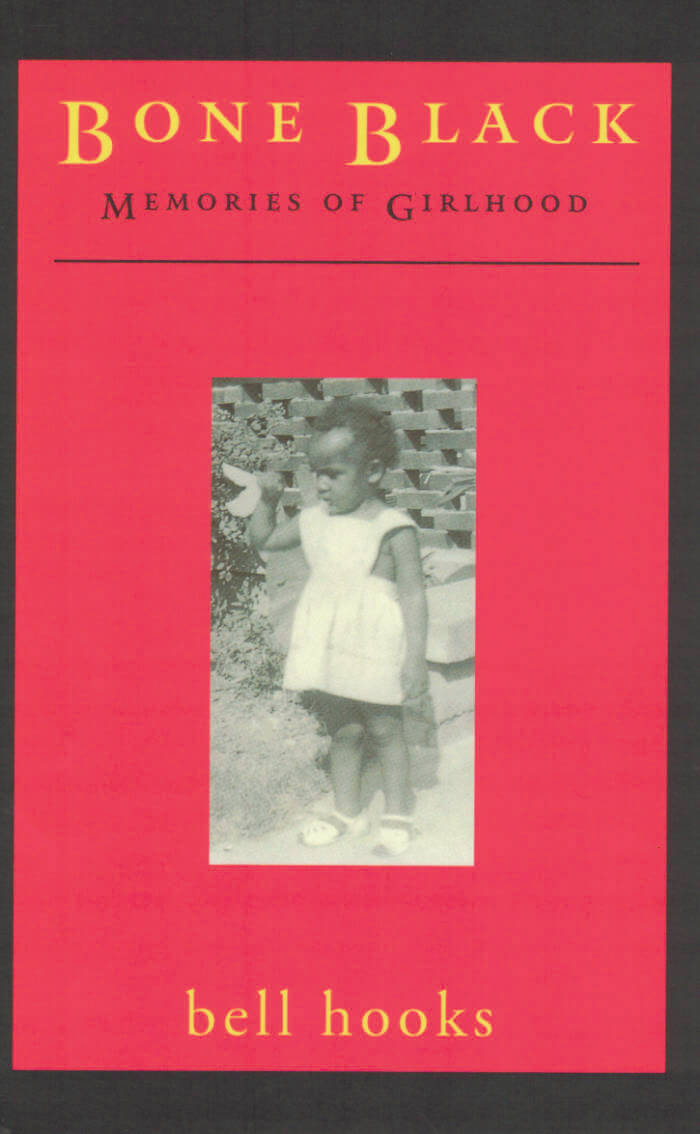
Bone Black Memories of Childhood
Stitching together girlhood memories with the finest threads of innocence, feminist intellectual bell hooks presents a powerfully intimate account of growing up in the South.
"With the emotion of poetry, the narrative of a novel, and the truth of experience, bell hooks weaves a girlhood memoir you won't be able to put down—or forget. Bone Black takes us into the cave of self-creation."— Gloria Steinem
A memoir of ideas and perceptions, Bone Black: Memories of Girlhood shows the unfolding of female creativity and one strong-spirited child's journey toward becoming a writer. She learns early on the roles women and men play in society, as well as the emotional vulnerability of children. She sheds new light on a society that beholds the joys of marriage for men and condemns anything more than silence for women. In this world, too, black is a woman's color—worn when earned—daughters and daddies are strangers under the same roof, and crying children are often given something to cry about. hooks finds comfort in solitude, good company in books. She also discovers, in the motionless body of misunderstanding, that writing is her most vital breath.
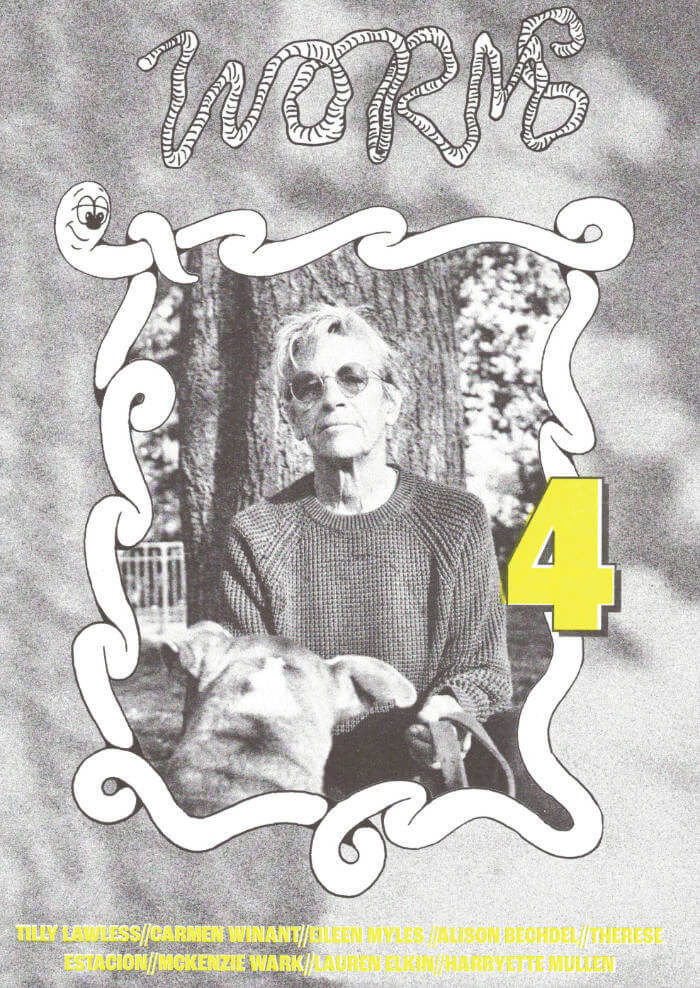
Worms #4 'The Flaneuse'
Worms #4 looks at psychogeography and the Situationists from a non-male perspective. Taking flâneuserie and the creative benefits of a good walk as its starting point, the issue features conversations with Eileen Myles, Alison Bechdel, Lauren Elkin, Tilly Lawless, Mckenzie Wark, Therese Estacion and Carmen Winant. 2021 was a fraught year for walking; the pandemic restricted our right to movement, while the murders of women walking in London led us to ask the question: how can the act of walking the streets spark political conversation?
Also included with this issue is an affirmation booklet in collaboration with @somuchluvindisclub
Worms is a biannual literary style magazine that celebrates female and non-binary writer culture.
‘If you’re reading this, you are a worm. We’re all worms, and in the end, we’re going to be eaten by them. As a (book)worm, you will fertilize your mind with glorious words…’
Founded in 2019 by Clem Macleod during her degree at Central Saint Martins, Worms began with a mad, spiralling obsession with the late Kathy Acker.

David Robilliard Notebooks 1983-1988
This book follows the first exhibition of Robilliard’s notebooks, ‘Disorganised Writings and Sketches’ with Rob Tufnell in Cologne in April 2019. It was made with support from the Elephant Trust and the book’s designers, A Practice for Everyday Life and with assistance from James Birch, one of David’s gallerists, and Chris Hall, custodian of the estate of Andrew Heard. The book is dedicated to Andrew Heard.
Rob Tufnell presents a new publication of extracts from the notebooks of the poet and artist David Robilliard (b.1952 – d.1988). After his premature death from an AIDS-related illness in 1988, Robilliard left a large number of notebooks in the care of his close friend and fellow artist Andrew Heard. These were obsessively filled with drafts of poems, diary entries, addresses and telephone numbers, blunt observations, quiet reflections, short stories, ideas for paintings, portraits and crude drawings. Robilliard’s superficially simple, pithy prose and verse is riddled with the dichotomies of an era that was both exuberant and miserable. His notebooks reveal his creative process, his interests, ideas, ambitions and then his illness but always embody his often repeated belief that ‘Life’s not good it’s excellent.’
Many of the books contain the inscription: ‘If found please return to 12 Fournier Street, London E1. Thank you’ – the home and studio of his patrons, Gilbert & George. In their lament ‘Our David’ (1990) they describe their protégé as:
“...the sweetest, kindest, most infuriating, artistic, foul-mouthed, witty, sexy, charming, handsome, thoughtful, unhappy, loving and friendly person we ever met... Starting with pockets filled with disorganised writings and sketches, he went on to produce highly original poetry, drawings and paintings.”
The publication exists in two editions: yellow and pink.
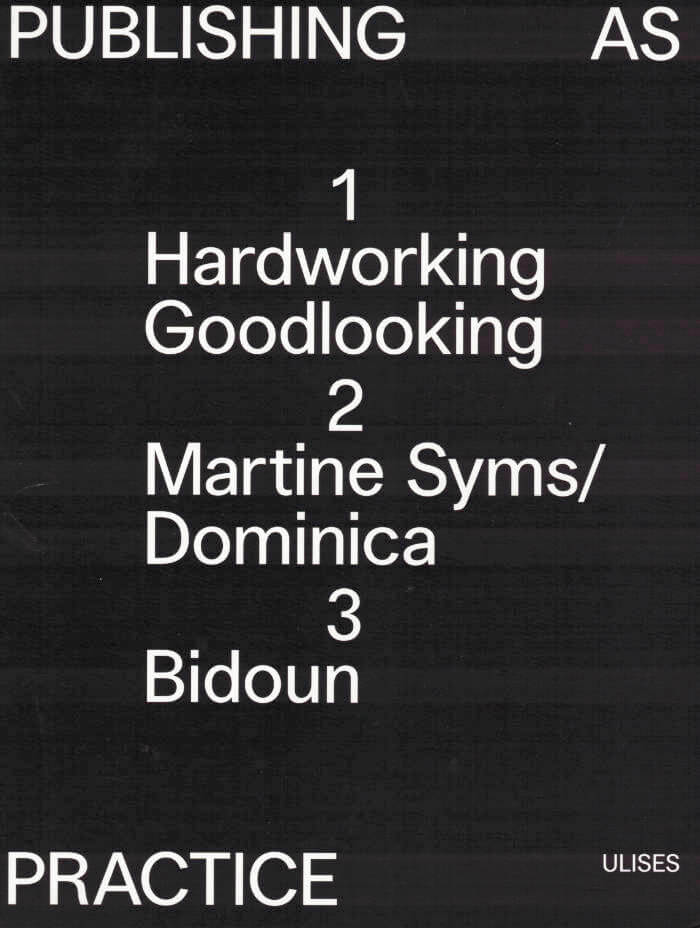
Publishing as Practice
Publishing as Practice centers on the work of three contemporary artists/book publishers who have developed fresh ways of broaching the political in publishing.
This book documents a residency program at Ulises—a curatorial platform based in Philadelphia—that explores publishing as an incubator for new forms of editorial, curatorial and artistic practice. Over the course of two years, three participants (Hardworking Goodlooking, Martine Syms/Dominica, and Bidoun) activated Ulises as an exhibition space and public programming hub, engaging the public through workshops, discussions, and projects.
Hardworking Goodlooking is a design and publishing imprint working primarily out of the Philippines. Dominica is an imprint run by artist Martine Syms dedicated to exploring Blackness as a topic, reference, marker, and audience in visual culture. Bidoun, a non-profit organization and magazine, focuses on art and culture from the Middle East and its diasporas. Each organization approached their residency at Ulises in a unique way, bringing a new understanding of what it means to practice publishing.
Edited by Kayla Romberger, Gee Wesley, Nerissa Cooney, Lauren Downing, and Ricky Yanas, Publishing as Practice features a preface by David Senior, Head of Library and Archives at the San Francisco Museum of Modern Art, and Ulises Carrión’s 1975 publishing manifesto “The New Art of Making Books.” Publishing as Practice also includes writing from Clara Balaguer, Hardworking Goodlooking, Martine Syms/Dominica, Bidoun, Lauren Downing, Kayla Romberger, and Gee Wesley alongside interviews, excerpts, and documentation from each residency.

"Vögel / Birds"
The book (DE/EN) gathers a selection of five short stories and two poems written between 2018 – 2021 by Benedikt Bock.
1st edition (400)
Copy editing German original: Frederike Niebuhr (linguistic services)
Translation and Proofreading: Good and Cheap Translators

The City We Became (paperback)
Three-time Hugo Award-winning and New York Times bestselling author N.K. Jemisin crafts her most incredible novel yet, a story of culture, identity, magic, and myths in contemporary New York City. In Manhattan, a young grad student gets off the train and realizes he doesn't remember who he is, where he's from, or even his own name. But he can sense the beating heart of the city, see its history, and feel its power. In the Bronx, a Lenape gallery director discovers strange graffiti scattered throughout the city, so beautiful and powerful it's as if the paint is literally calling to her. In Brooklyn, a politician and mother finds she can hear the songs of her city, pulsing to the beat of her Louboutin heels. And they're not the only ones. Every great city has a soul. Some are ancient as myths, and others are as new and destructive as children. New York? She's got six.
N. K. Jemisin is the first author in history to win three consecutive Best Novel Hugo Awards, all for her Broken Earth trilogy. Her work has also won the Nebula, Locus, and Goodreads Choice Awards. She has been a reviewer for the New York Times Book Review, and an instructor for the Clarion and Clarion West writing workshops. In her spare time, she is a gamer and gardener, and she is also single-handedly responsible for saving the world from King Ozzymandias, her dangerously intelligent ginger cat, and his phenomenally destructive sidekick Magpie.
Published July 2021

Vernon Subutex 3
As storm clouds gather, portending a final reckoning, ersatz rave-cult leader Vernon Subutex decides to return to Paris. Even if it means leaving behind his disciples. He has to. He’s got a dentist’s appointment.
Back in the city, he learns that an old friend from his days homeless on the Paris streets has died and left him half of a lottery win. But when Vernon returns to his commune with news of this windfall, it’s not long before his disciples turn on each other. Such good fortune does not accord with the principles Vernon has handed down.
Meanwhile, the monstrous film producer Laurent Dopalet is determined to make Aïcha and Céleste pay for their attack on him, whatever it takes and whoever gets hurt. And, before long, the whole of Paris will be reeling in the wake of the terrorist atrocities of 2015 and 2016, and all the characters in this kaleidoscopic portrait of a city and era will be forced to confront one another one last time. In the wake of all this chaos and hate, the question will rise again: After all he’s been through, who is Vernon Subutex? And the answer: He is the future.
Virginie Despentes’s epochal trilogy ends with Vernon Subutex 3—in fire, blood, and even forgiveness. But not everyone will survive to see the dawning of the golden age of Subutex.

Yvonne Rainer Work 1961-73
It goes without saying that a dance is a dance and a book about dance is a book. Though they may meet at the intersection of Art and Good Intentions, I find myself greedy. I have a longstanding infatuation with language, a not-easily assailed conviction that it, above all else, offers a key to clarity. Not that it can replace experience, but rather holds a mirror to our experience, gives us distance when we need it. So here I am, in a sense, trying to 'replace' my performances with a book, greedily pushing language to clarify what already was clear in other terms. But, alas, gone. This has seemed one good reason to compile a book out of the remains of my performances, letting the language fall where it may. Let it be said 'She usually makes performances and has also made a book.' -Yvonne Rainer
Forty-five years after its publication, Primary Information brings Yvonne Rainer's classic book back into print in an exact facsimile.
In 1974, Yvonne Rainer published Work 1961-73, an illustrated catalog of her performance works up to that point. In these years, as the art world turned toward minimalism, Rainer and her Judson Dance Theater colleagues were engaged in a parallel, and equally radical, redefinition of dance. Stripping dance of its pomp and self-serious virtuosity, they created what dancer and choreographer Pat Catterson has called "the people's dance." Or, as Rainer put it, instead of the "overblown plot" of traditional dance, she explored the "obvious" alternative: "stand, walk, run, eat, carry bricks, show movies, or move and be moved by some thing other than oneself."
Work 1961-73 chronicles the years when Rainer found herself and her work at the heart of a revolution in dance, performance and art. Written in Rainer's wonderful frank, funny and perceptive prose, and illustrated with photographs, handwritten scores, sketches, press articles and ephemera, Work 1961-73 is a period document and an instruction manual, an archive and a manifesto.
A sought-after, rare classic, Work 1961-73 is brought back into print in a true facsimile edition by Primary Information; the only change is the small addition of new notes at the back of the book.
One of the most influential artists of her generation, dancer, choreographer and filmmaker Yvonne Rainer (born 1934) was a founding member of Judson Dance Theater in New York City and a leading figure in the development of minimalist and postmodern dance.

Whose Land Have I Lit on Now? – Contemplations on the Notions of Hospitality
Elena Agudio, Bonaventure Soh Bejeng Ndikung and 1 more
A curatorial project about concepts of hospitality and the triggers of hostility in hospitality.
The unlikely seemed possible in the summer of 2015, as thousands of immigrants from mostly Syria made their way to Germany and Angela Merkel made the statement "Wir schaffen das" (We can do it/ we can cope with it). A German's venture into open hospitality was being witnessed as the country celebrated its newfound "Willkommenskultur." Soon enough, however, the summer of grace became the autumn of rage and the winter of nightmares, as the initial goodwill turned into the resurgence of the extreme right in Germany. Much is happen- ing today that calls for a reflection on hospitality in Germany, in Europe, and in the world at large. Taking as a point of departure Derrida's notion of "hostipitality" – that is the presence of hostility in all hospitality and hosting–this anthology brings together original contributions from artists, scholars, activists, poets, curators, and musicians who reflect on different experi- ences and notions of hospitality.
In an age of flourishing resentments and antipathy towards all that seems conceptually or physically "strange"/ a "stranger," in a time when the historical violence of the guest (as a colonizer) over the host is reiterated and fortified; in an era that has turned hospitality into a neoliberal commodity, it becomes urgent to reconsider hospitality's gradients of power.
Contributions by Elena Agudio,Mohamed Amjahid, Ulf Aminde, Arjun Appadurai, Federica Bueti, Ibrahim Arslan, Joshua Chambers-letson, Bilgin Ayata, Jill Denton, Jihan El-tahri, Denise Ferreira Da Silva, Seloua Luste Boulbina, Raisa Galofre, Lionel Manga, Peter Morin, Massimo Perinelli, Naeem Mohaiemen, Miriam Schickler, Farkhondeh Shahroudi, Safiya Sinclair, Bonaventure Soh Bejeng Ndikung, Denise Ryner, Margarita Tsomou, Tania Willard.

Randy 2010-2013
RANDY is a 300-plus page full color anthology of RANDY zines spanning 2010-2013. Initiated by artist A.K. Burns and publisher Sophie Mörner, RANDY was a fearless celebration of queer/feminist arts.
Contains over 100 interviews, conversations and projects including work by:
niv Acosta, Jess Arndt, Meriem Bennani, Sadie Benning, Elizabeth Bethea, Ramdasha Bikceem, Cass Bird, Dana Bishop-Root, Pauline Boudry, boychild, Kathe Burkhart, Nao Bustamante, Jibz Cameron, Silvia Casalino, Christelle de Castro, Leidy Churchman, Jon Davies, Hayden Dunham, Celeste Dupuy-Spencer, Nicole Eisenman, Edie Fake, Corrine Fitzpatrick, Daphne Fitzpatrick, Shannon Funchess, Mariah Garnett, Luke Gilford, Julia Gillard, Jules Gimbrone, Reina Gossett, Goodyn Green, Gordon Hall, Harmony Hammond, Onya Hogan-Finlay, Emily Hope, Katherine Hubbard, Amber Ibarreche, Mariana Juliano, Stanya Kahn, Sarah Forbes Keough, Pozsi B Kolor, Adam Krause, Lisa Lenarz, Katerina Llanes, Amos Mac, Lee Maida, India Salvor Menuez, Lessa Millet, MPA, Ulrike Müller, Sheila Pepe, Litia Perta, Cassie Peterson, Isaac Preiss, R.H Quaytman, Jen Rosenblit, Colin Self, Mel Shimkovitz, Amy Sillman, Tuesday Smillie, Jazmin Venus Soto, Matthew Stone, Ginger Brooks Takahashi, Lanka Tattersall, Wu Tsang, Scott Valentine, Leilah Weinraub, Hanna Wilde, Martha Wilson, Io Tillett Wright, Geo Wyeth, Yes! Association/Föreningen Ja!
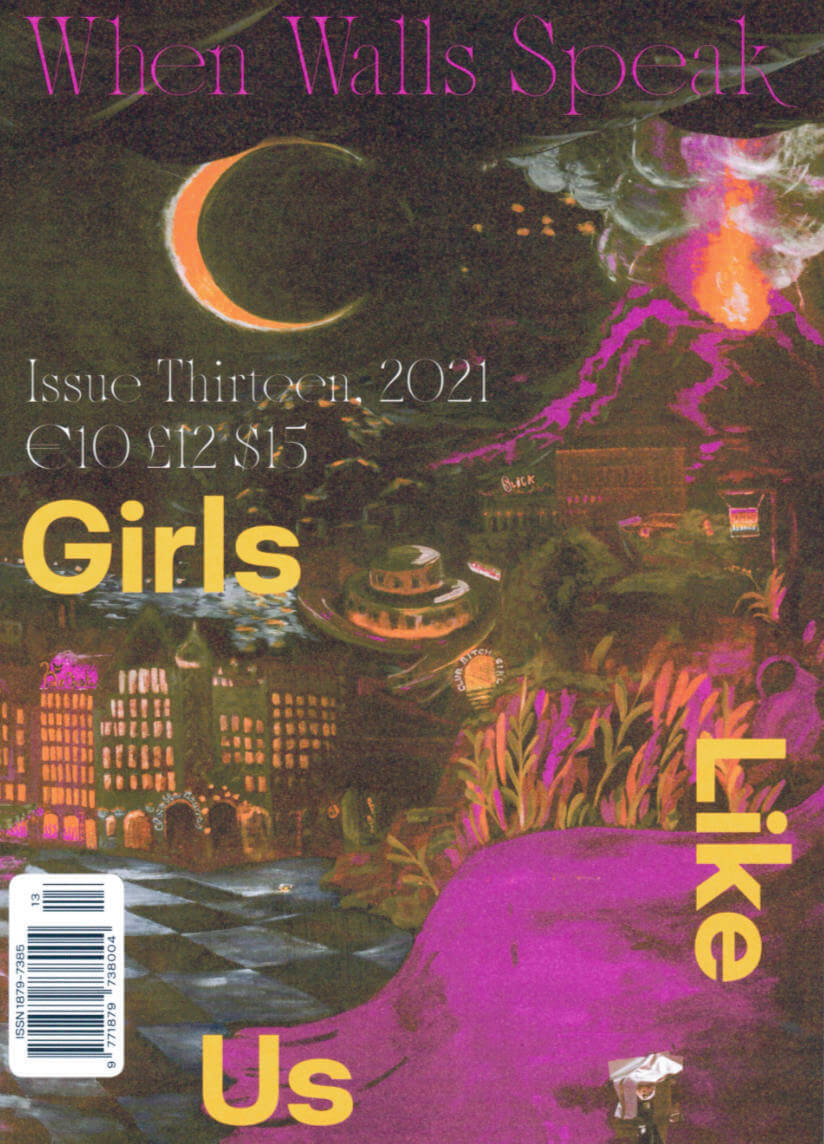
Girls Like Us #13 - The Club Scene
There can never be enough queer spaces, and the club is as good a place as any to begin an exploration. For generations, the club has been a space of legend, gossip, hearsay, and queer history, a place to gather and build community, to feel safe and experiment. The editors of ‘Girls Like Us’ decided to make a guest-edited issue centred around queer architecture back in 2019, long before the pandemic hit. They found the Swedish queer art and architecture collective MYCKET to fill this role, and later also realised how much club spaces were missed in pandemic times. Because, missing clubbing is one thing, but not being able to dance is something else entirely.
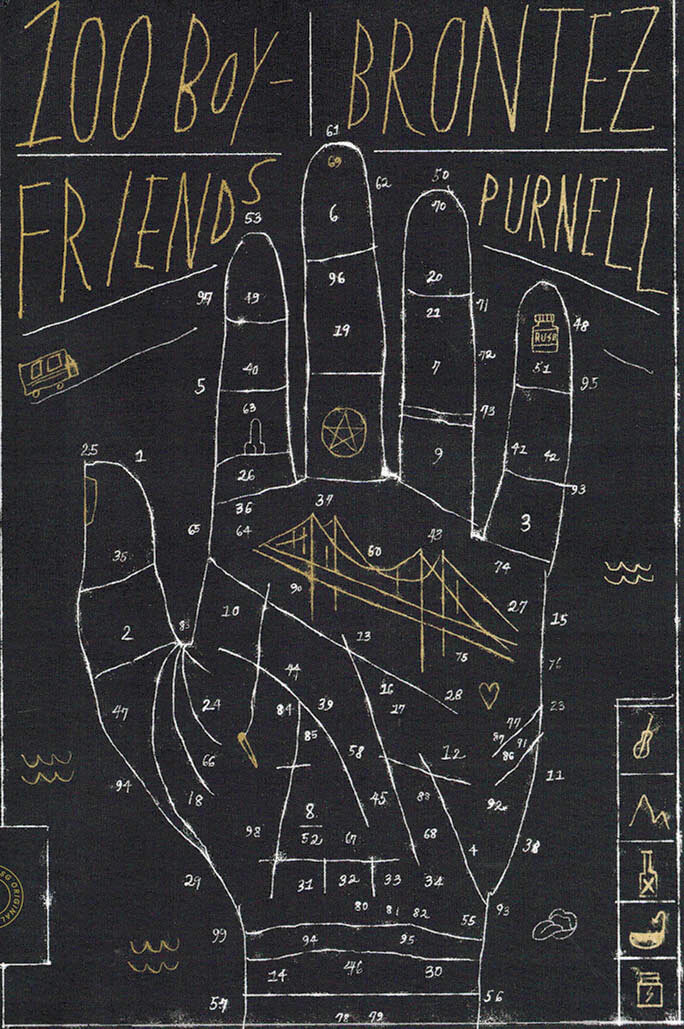
100 Boyfriends
Transgressive, foulmouthed, and brutally funny, Brontez Purnell's 100 Boyfriends is a revelatory spiral into the imperfect lives of queer men desperately fighting the urge to self-sabotage. As they tiptoe through minefields of romantic, substance-fueled misadventure, from dirty warehouses and gentrified bars in Oakland to desolate farm towns in Alabama, Purnell's characters strive for belonging in a world that dismisses them for being Black, broke, and queer. In spite of it, or perhaps because of it, they shine.
"Brontez Purnell has such seemingly casual genius that at times you forget you're reading a book and are transported to some couch/bus/basement where the drugs are really good and your friend is really funny, maybe your weird closeted cousin is on HarlemHookups in the corner, and all of a sudden your friend says some fucking Sappho ass, weird ass, brilliant ass bullshit. I love this slut of a book, it's a slut ass maker. 100 Boyfriends or no new boyfriends at all, Purnell's autofiction/memoir/whatever the hell this marvelously sad and intoxicating book is shook me up good with its honesty and blunt-to-face endings, the jokes and stories I didn't know we were allowed to tell outside of circles of faggots and misfits. But this book is in those circles, makes you tea and steals for you, it invites us in, but would we mind shutting the hell up cause it's a little hungover? The light is coming through the windows so clear." — Danez Smith, author of Homie
Brontez Purnell is a writer, musician, dancer, filmmaker, and performance artist. He is the author of a graphic novel, a novella, a children's book, and the novel Since I Laid My Burden Down. The recipient of a 2018 Whiting Writers' Award for Fiction, he was named one of the thirty-two Black Male Writers of Our Time by T: The New York Times Style Magazine in 2018. Purnell is also the frontman for the band the Younger Lovers, a cofounder of the experimental dance group the Brontez Purnell Dance Company, the creator of the renowned cult zine Fag School, and the director of several short films, music videos, and the documentary Unstoppable Feat: The Dances of Ed Mock.
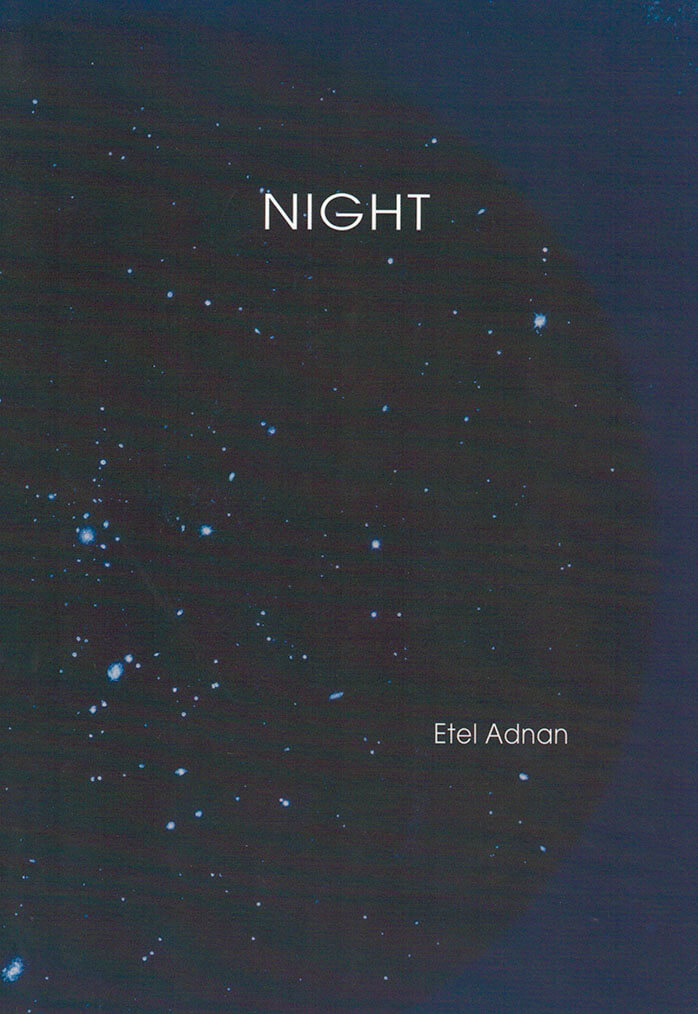
Night
Born in 1925 in Beirut, ETEL ADNAN has written more than a dozen books of poetry, fiction, and essays. A two-volume collection, To look at the sea is to become what one is: An Etel Adnan Reader, was published in 2014. She is a recipient of a PEN Oakland-Josephine Miles Award, the California Book Award, a Lambda Book Award, and a Chevalier des Arts et des Lettres. She lives in Paris and Sausalito, California.
"Trained in philosophy, Beirut-born author/activist Adnan blends a meditation on the meaning of memory with memories themselves, dredged up from a long life. And surely night, her setting here, is the time for such dredging. Adnan rigorously asserts that "reason and memory move together." But she argues that "a remembered event is a return to a mystery," and her writing is eye-openingly lush, gorgeous, even surreal ("waves of roses are blanketing memory"), showing us the mind at work on its unstructured, uncertain edges. The epigrammatic ending, "Conversations with my soul" ("Why are we lonelier when/ together"), will feed even those who don't typically read poetry. VERDICT A good way for sophisticated readers to recall why they first loved verse." — Library Journal

Faux Pas
Essays on art-making, abstraction, humor, not-knowing, awkwardness and more, from one of New York’s most influential and popular painters and teachers
Since the 1970s, Amy Sillman—a beloved and key figure of the New York art scene—has developed a singular body of work that includes large-scale gestural paintings blending abstraction with representation, as well as zines and iPad animations.
Over the past decade, Sillman has also produced stimulating essays on the practice of art or the work of other artists: for example, reevaluating the work of the abstract expressionists with a queer eye; elaborating on the role of awkwardness and the body in the artistic process; and discussing in depth the role and meanings of color and shape. Featuring a foreword by Lynne Tillman, Faux Pas is the first book to gather a significant selection of Sillman’s essays, reviews and lectures, accompanied by drawings, most of them made specially for the book.
Faux Pas aims at revealing the coherence and originality of Sillman’s reflection, as she addresses the possibilities of art today, favoring excess over good taste, wrestling over dandyism, forms over symbols, with as much critical sense as humor. As Jason Farago notes in the New York Times, "Sillman is in a thin crowd (with, let’s say, Andrea Fraser, Hito Steyerl, Matias Faldbakken, David Salle) of artists who can really write. The evidence is in Faux Pas ... her writings display the same good humor and intelligence of her best paintings."
Based in New York City, Amy Sillman (born 1955) is an artist whose work consistently combines the visceral with the intellectual. She began to study painting in the 1970s at the School of Visual Arts and she received her MFA from Bard College in 1995. Her work has been exhibited internationally, including at the Whitney Biennial in 2014; her writing has appeared in Bookforum and Artforum, among other publications. She is currently represented by Gladstone Gallery, New York.
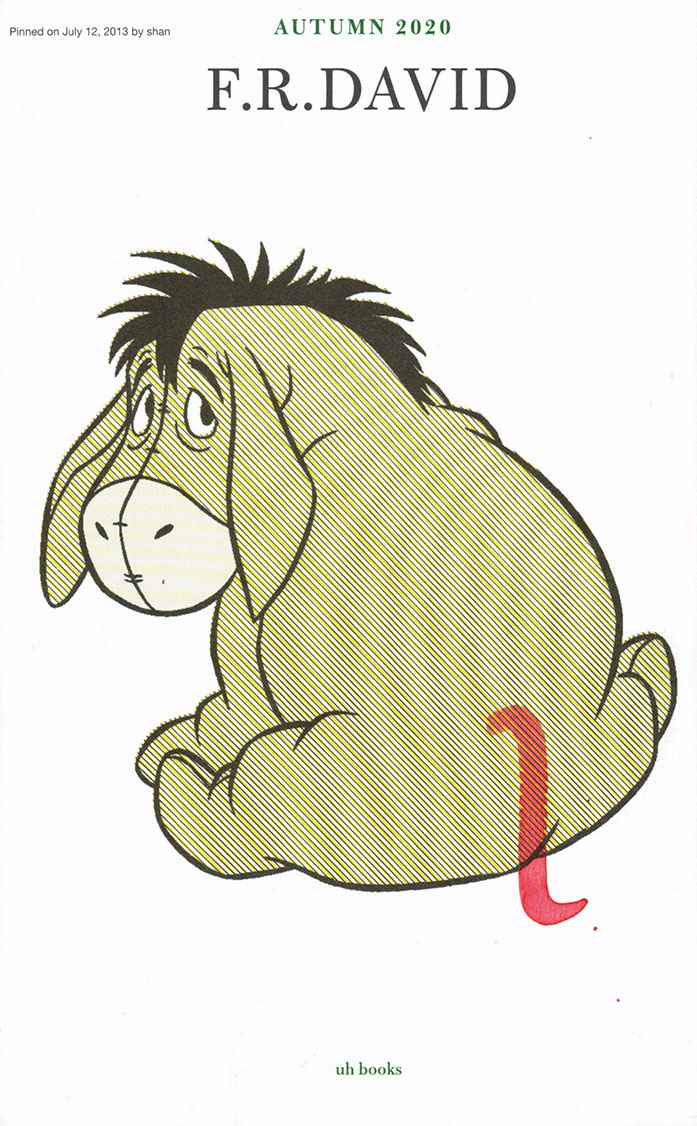
F.R. David - Correctional Facility
F.R.DAVID is a typographical journal, dealing with the organisation of reading and writing in contemporary art practises. The 20th issue, “Correctional Facility” is edited by Will Holder paying attention to difference; and transformations between
accident⎱design 249
acorn⎱oak 293–94, 297–98
adult⎱child 95, 139, 207, 308
alphabetic⎱postliterary 3
alphabetic⎱postalphabetic 3, 5
alphabetic⎱analphabetic 5
analytic⎱linguistic 298
ankh⎱kiss
angles⎱angels 162
aristocrat⎱ass 12
ass⎱man 28
aye⎱eye 160
bad⎱good 130
(outstandingly⎱remarkably)
before⎱after 19, 49, 51, 158,
201, 263, 305
bitter⎱sweet 65, 163, 217
both⎱and 8, 119, 123, 160, 173, 180, 245, 292, 298
cart⎱horse 2, 9
coming into being⎱passing away 318
communism⎱democracy 319
composition⎱improvisation
163, 168, 170
concrete⎱abstract 288
dark⎱light 43, 64, 127, 223,
261, 300, 309, 316
diegetic⎱non-diegetic 145, 193
dropped out⎱drop doubt 160
either⎱or 6, 14, 39, 43, 54, 85, 119, 120, 132, 195, 223, 249, 288
emotional⎱intellectual 297
enthusiastic⎱tempered 13, 78, 205
ἕν καἰ τὀ πᾶν⎱one and all 224
everything⎱fragment 33, 138
everything⎱all things 218–22
experience⎱attention 39, 40, 65, 254–5
green⎱blue 127
high modernism⎱post-structuralist⎱postmodernism 165
radical modernism⎱modernism⎱
postmodernism 4, 164–66
I⎱sigh 160
image⎱word 6, 72, 316–18
Isis⎱Isis 226
jar⎱jars 76, 158, 159
left⎱right 7, 28, 127, 217
meaningful⎱meaningless 258
oak (a⎱ok) 290, 293–94, 297–98
orality⎱textuality 3, 264
phoneme⎱letter 180
phonetic⎱ideogrammatic 297
shit⎱gold †
signal⎱noise 39, 40, 65, 254–55
sweat⎱tears 292
tail⎱bell-rope 151, 154
thesis⎱antithesis 322
written⎱unwritten 158, 296–97
vowel⎱consonant 180–82, 292
we are⎱we ain’t 93
white pawn⎱white pawn 224
word⎱world 8, 12, 138, 160, 165, 166, 180, 183, 260, 265, 287, 298, 300, 315, 317
writing⎱nature 27, 44, 83, 120,
121, 126, 166, 183, 198, 203,
219–20, 252, 297, 318–19
Published October 2020.
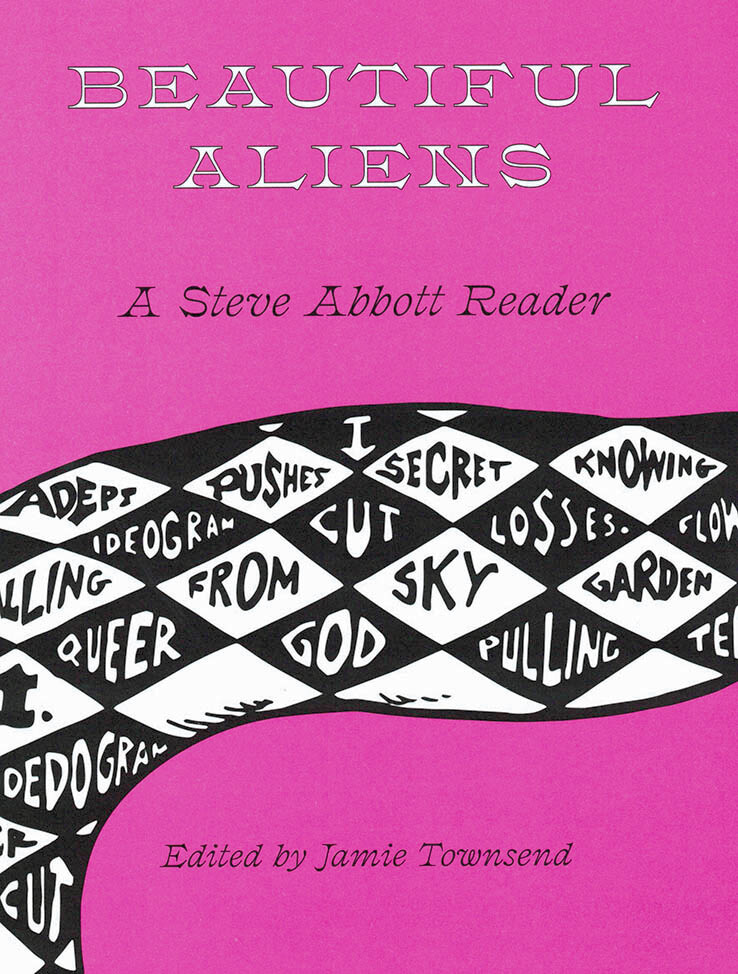
Beautiful Aliens: A Steve Abbott Reader
Beautiful Aliens: A Steve Abbott Reader is a landmark collection representing the visionary life's work of beloved Bay Area luminary Steve Abbott. It brings together a broad cross-section of literary and artistic work spanning three decades of poetry, fiction, collage, comics, essays, and autobiography, including underground classics like, Lives of the Poets and Holy Terror, rare pieces of treasured ephemera, and previously unpublished material, representing a survey of Abbott's multivalent practice, as well as reinforcing his essential role within the contemporary canon of queer arts.
"Holy Terror is good reading, well written and extremely knowledgeable about the subject of magic black and white. In fact, all magic is both."—William Burroughs
"All of us who knew the late Steve Abbott will now be happy that the stone has rolled back, to reveal the amazing accomplishment of Beautiful Aliens, poet Jamie Townsend's masterful take on Steve's multigenre work. Prose, poetry, journalism, the essay, the comic book, the novel: Steve was driven to try his hand at all these categories, excelling more often then you'd think possible. It's time that people knew a genius (of sorts) once lived at the corner of Haight and Ashbury." —Kevin Killian
Steve Abbott (1943-1992) was a poet, critic, editor, novelist and artist. Abbott was raised in Lincoln, Nebraska, graduated from the University of Nebraska, and attended Emory University where he was an organizer for Atlanta's Gay Liberation Front and the gay lib editor at the underground paper The Great Speckled Bird. Abbott moved to San Francisco in 1974 where he became was a frequent contributor to local publications, including The Advocate, The Sentinel, and the Bay Area Reporter. He was also one of the founding editors of the literary arts newsletter Poetry Flash and the publisher/editor of the literary journal Soup. Steve wrote a number of books of poetry and prose during the 1980s and early 90s including: "Wrecked Hearts", "Stretching the Agape Bra", "Lives of the Poets", "Holy Terror", "Skinny Trip to a Far Place", and "View Askew: Postmodern Investigations", a book that collects Steve's essays from The San Francisco Sentinel, The Advocate, and the arts journal Mirage. He was active in various reading series and discussion groups in the Bay Area, including Cloud House and Small Press Traffic, and, in 1981, he co-organized the historic Left/Write conference. Steve was also a respected critic and the first to use the term "New Narrative" to describe the work of contemporaries including Bruce Boone and Robert Glück. Abbott died of complications due to AIDS on December 2, 1992. His novel The Lizard Club was published posthumously. Jamie Townsend is a genderqueer poet, publisher, and editor living in Oakland, California. They are half-responsible for Elderly, a publishing experiment and persistent hub of ebullience and disgust. They are the author of several chapbooks including, most recently, Pyramid Song (2018) as well as the full-length collection SHADE (2015). An essay on the history of the New Narrative magazine Soup was published in The Bigness of Things: New Narrative and Visual Culture (2017).
Published December 2019.
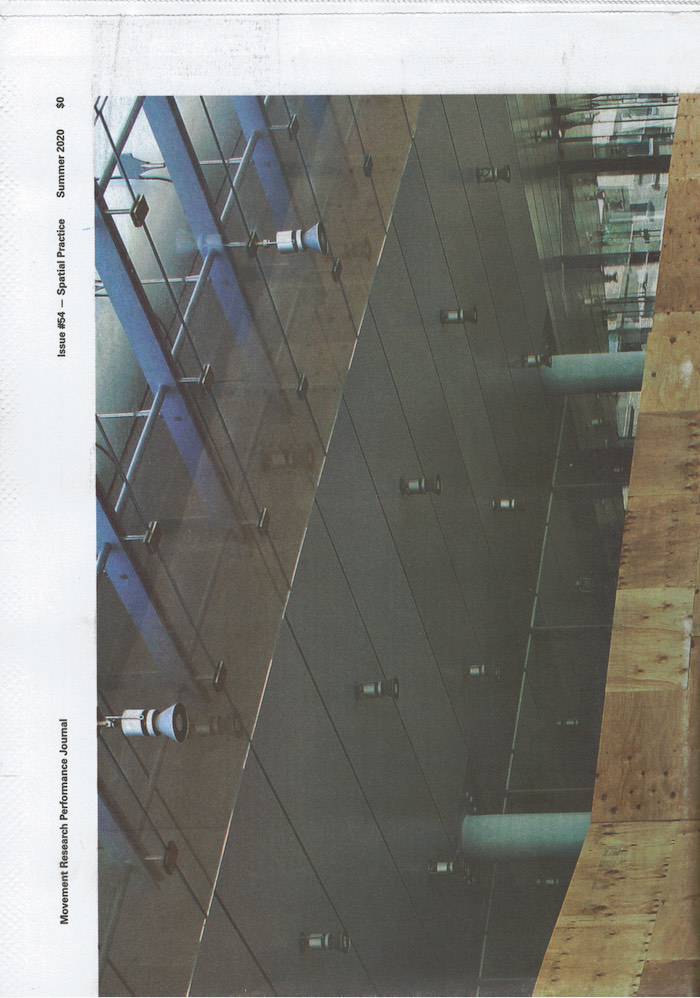
Movement Research Performance Journal
Movement Research Performance Journal #54
Movement Research announces Issue 54 of its publication, the Movement Research Performance Journal. Continuing to experiment with approaches that engage contemporary choreography and performance through the medium of print—poem, prose, image, interview and a wide range of formats give form to critical and self-reflexive discourses and material histories. Movement Research Performance Journal acts as a site of convergence between publication, editors, writers, designers, and artists to consider the place of dance, performance, and choreography in relation to the contemporary moment.
For MRPJ54: Spatial Practice, guest editor, artist Alan Ruiz invited contributors to examine the ongoing legacy of neoliberalism and the cultural production it engenders, specifically focusing on the relation between bodies and the built environment. Contributors have explored the contexts and histories in which we dwell, create, and coexist to interrogate how space is produced both as material and ideology during the hyper-development and hyper-exploitation of the urban environment, predominantly in New York City. Spatial Practice asks: how does this impact the bodies that labor and move to keep the kinetic machine of “progress” moving? Contributions offer multiple perspectives—through a variety of genres—on the ways in which the political project of neoliberalism has, in part, shaped the designation and use of public space as well as enthroned the philanthropic class and the cultural institutions associated with them. Alongside the consolidation of wealth and power, neoliberalism’s underlying insistence on individualism has also reinforced and normalized the braided conditions of capitalist exploitation, structural racism, and patriarchal domination. Unraveling this logic allows us to collectively imagine alternatives to the prevailing systems of property, dispossession, ableism, and incarceration that parcelize existence.
Contributions from:
Critical Resistance, Alan Ruiz, Lluís Alexandre, Casanovas Blanco, Julie Tolentino and Sadia Shirazi, Kaegan Sparks, Martha Rosler, Suzanne Stephens, Joshua Lubin-Levy, Lo-Yi Chan and Tim Hartung, Olive McKeon, Alice Sheppard, Biba Bell, Erik Thurmond, BRANDT : HAFERD, V. Mitch McEwen and Olivier Tarpaga, Sarah Oppenheimer, Jimmy Robert and Mario Gooden, Dominic Cullinan, Angela Davis J. Bouey and Melanie Greene, Lisa Nelson, Diana Crum, Kristopher, K.Q. Pourzal, Jess Barbagallo, John Hoobyar and Simon Asencio, Layla Zami, Cristiane Bouger, Daria Faïn and Marjana Krajač, Germaine Acogny, Helmut Vogt and André Zachery, Milka Djordevich and Tim Reid, Melanie Maar.
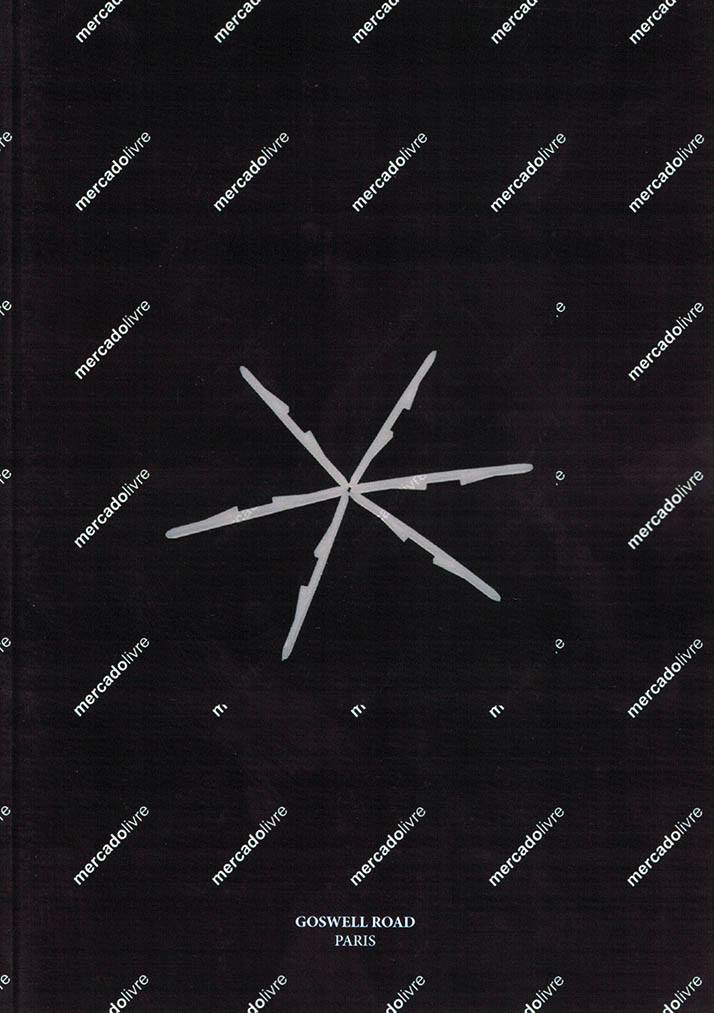
Mercado Livre
Wisrah Villefort’s overarching research focuses on the nonhuman, digital matter, synthetic polymers, prosthetics and their markets.
The ongoing hypermedia work Mercado Livre begun in 2017, is dependent on the viewer performing online, accessing the platform via Instagram. Villefort collects images from online marketplaces based in the Global South, outside of the West, including AliExpress (China) and Mercado Livre (Argentina) for the content. Mercado Livre, besides being the title of the work and the platform, is also the term for the neoliberal principle of the “free market”, in which goods’ prices supposedly regulate themselves.
This book accompanies his exhibition, THE MOUTH OF THE GIFTED HORSE, dissecting Mercado Livre through the eyes of the show, focussing on inter-species relationships and non-human prosthetics, featuring a text written by Villefort during his recent research residency at Pivô, São Paulo, entitled 'Notes on Masks, Gloves and Muzzles: Beyond the Fault of Epimetheus'.
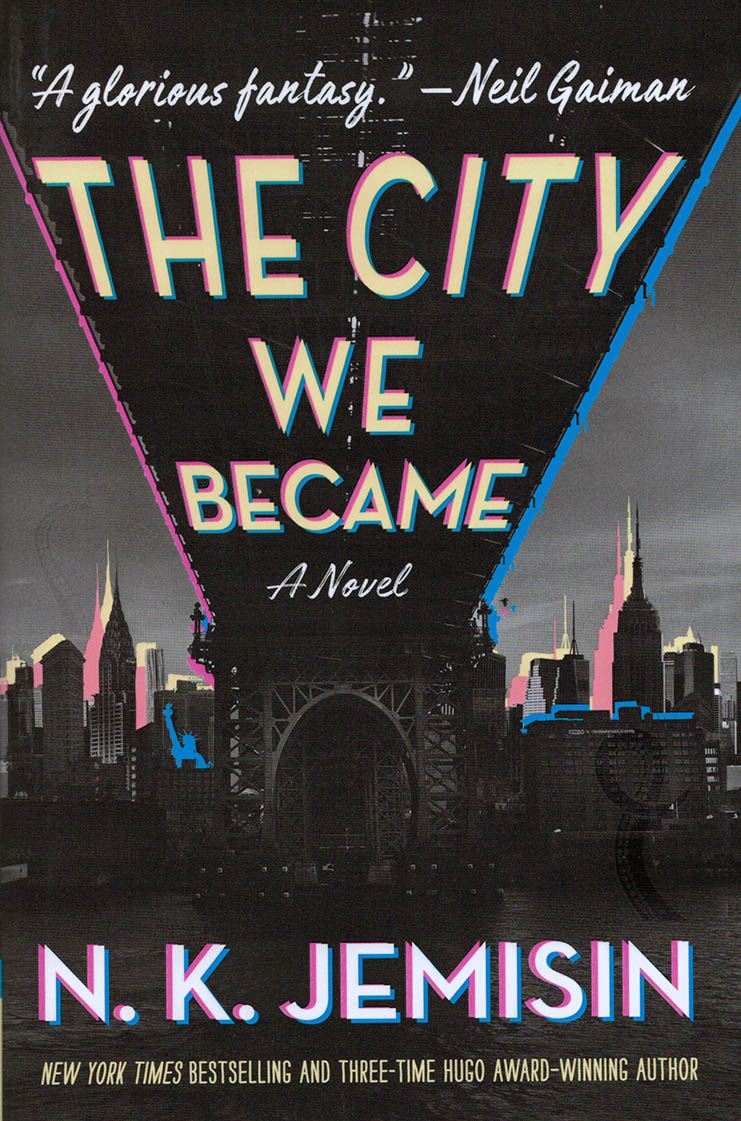
The City We Became
Three-time Hugo Award-winning and New York Times bestselling author N.K. Jemisin crafts her most incredible novel yet, a story of culture, identity, magic, and myths in contemporary New York City. In Manhattan, a young grad student gets off the train and realizes he doesn't remember who he is, where he's from, or even his own name. But he can sense the beating heart of the city, see its history, and feel its power. In the Bronx, a Lenape gallery director discovers strange graffiti scattered throughout the city, so beautiful and powerful it's as if the paint is literally calling to her. In Brooklyn, a politician and mother finds she can hear the songs of her city, pulsing to the beat of her Louboutin heels. And they're not the only ones. Every great city has a soul. Some are ancient as myths, and others are as new and destructive as children. New York? She's got six.
N. K. Jemisin is the first author in history to win three consecutive Best Novel Hugo Awards, all for her Broken Earth trilogy. Her work has also won the Nebula, Locus, and Goodreads Choice Awards. She has been a reviewer for the New York Times Book Review, and an instructor for the Clarion and Clarion West writing workshops. In her spare time, she is a gamer and gardener, and she is also single-handedly responsible for saving the world from King Ozzymandias, her dangerously intelligent ginger cat, and his phenomenally destructive sidekick Magpie.
Published March 2020

In The Shadow Of Forward Motion
David Wojnarowicz's In the Shadow of Forward Motion was originally published as a photocopied zine/artist's book to accompany an exhibition of the same name at PPOW Gallery in 1989. Despite its meager print run of just 50 copies, the publication has garnered a legendary status, and for good reason.
In it we find, for the first time, Wojnarowicz's writing and visual art, two mediums for which he is renowned, playing off each other in equal measure. We glimpse the artist's now iconic mixed-media works, with motifs of ants, locomotives, money, tornados and dinosaurs, juxtaposed with journal-like texts or "notes towards a frame of reference" that examine historical and global mechanisms of power symbolized through the technology of their times.
Wojnarowicz uses the fractured experience of his day-to-day life (including dreams, which he recorded fastidiously) to expose these technologies as weapons of class, cultural and racial oppression. The artist's experience living with HIV is a constant subject of the work, used to shed light on the political and social mechanisms perpetuating discrimination against not only himself, but against women and people of color, who faced additional barriers in their efforts to receive treatment for the illness. Rooted in the maelstrom of art, politics, religion and civil rights of the 1980s, the book provides a startling glimpse into an American culture that we have not yet left behind. Félix Guattari provides an introduction.
Painter, photographer, writer, filmmaker, performance artist, songwriter and activist, David Wojnarowicz was born in Redbank, New Jersey, in 1954 and died of AIDS in New York in 1992. The author of five books—most famously Close to the Knives: A Memoir of Disintegration—Wojnarowicz attained national prominence as a writer and advocate for AIDS awareness, and for his stance against censorship.
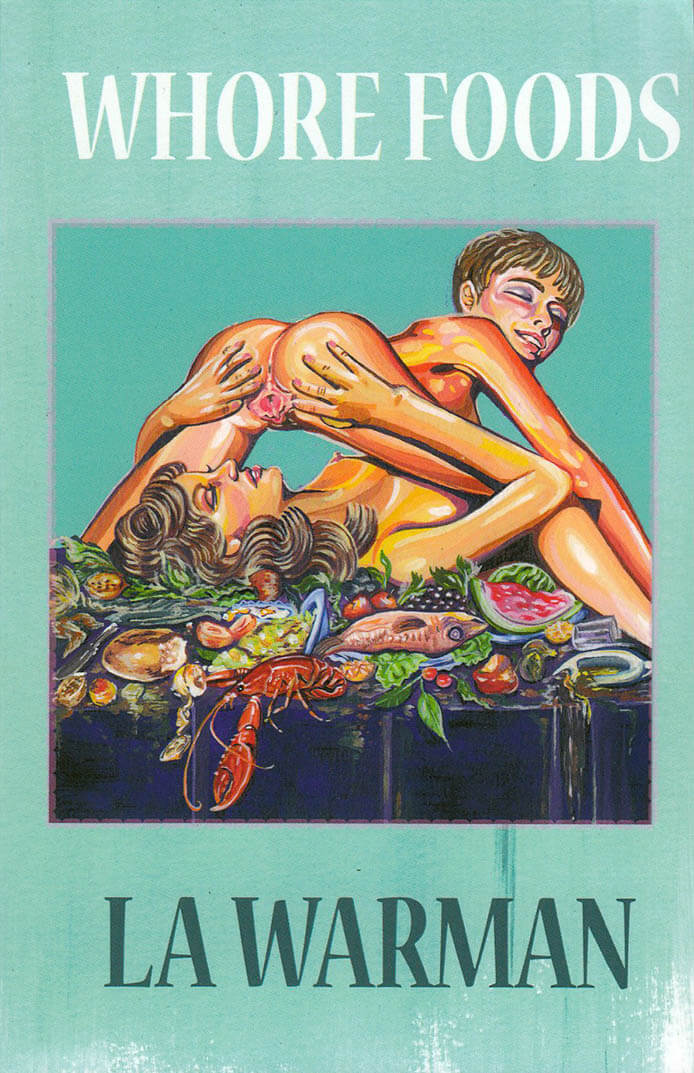
Whore Foods
Collecting and expanding pieces from her seminal newsletter detailing the inner and outer sexual life of a grocery store cashier, LA WARMAN'S WHORE FOODS is a guaranteed feast for sore thighs. Now available in raw pulp paperback form for the first time. Cleanup in Aisle 4.
"She made fun of the construction workers for not being white, for not knowing time like she knows time and I can’t say “That’s racist” because I am on the job. I am getting paid not to speak. I am getting paid to open up my body to you but not reveal it. The way I put my eyes down when you fight with your husband in line. To shit my pants only a little so you can’t see. The smell of watercress, pineapple, rice, and shit. She’s in my line again asking me if I eat ass.
Yes, sometimes.
Saw a good ass, saw a real good ass."
LA Warman is a poet and performer. She is the founder of GLASS PRESS, a publisher of art and poetry on flash drives. Warman has had work in shows at MOCA Cleveland, ICA Philadelphia, Time-Based Art Festival, General Public Collective, Flying Object, A.T.M. Gallery, and Open Engagement. Her chapbooks How to Become a Lesbian and THE CAVE THE CHURCH THE BEDROOM THE MALL were published by Inpatient Press and After Hours Ltd. Warman wrote and directed a 12 hour text and movement performance piece, Break, that premiered at Deli Gallery in 2018. She teaches Erotica classes online at LAWarman.com and in Brooklyn.